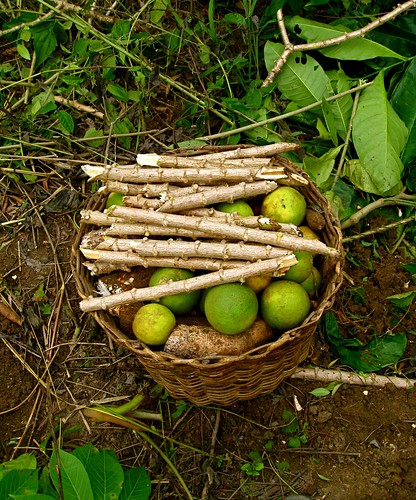 |
| The harvest in Ghana: oranges and cassava |
It's October 1st, 2014. The year is rapidly winding down, which leaves little but the prospects for our future to consider. There's a good bunch of people - researchers, politicians, starry-eyed nonprofiteers - who are concerned because that future is one in which our same little planet must feed 8-10 billion people. Factoring changing dietary preferences and the degradation of land, not to mention insufficient increases in agricultural productivity, this concern does not seem unfounded.
Since I think about agriculture and food a lot (OK, maybe all the time), it was exciting to see the proposal of a solution not focused on yield or production. A group of researchers published an interesting article in Nature focused on changing demand as a means to reduce the impacts of food on climate change. They set about modeling future food needs, the land able to support crops and animals, and a bunch of variables that influence the conversion of what goes in to what makes it to the dinner table.**
Ultimately, they wanted to determine the extent to which "sustainable intensification" (basically getting more from the same land/chemical additions, with a smaller environmental footprint) and shifting future demand could contibute to feeding Earth's 2050 human population. The first conclusion? Producing animal products - meat and dairy - is terribly inneficient in terms of how much energy from biomass goes in versus usable calories that come out, and that amound of land needed!
 |
| The harvest in Prague: cream puff and tartlets |
Food loss and waste was also raised as a significant consideration (with reference to other studies currently estimating anywhere from one quarter to half of what is produced is lost). But, it matters when the waste happens. If you throw out a hamburger, there are more embedded calories than say a bowl of lentils.
So, taking dietary preferences and food loss/waste as the main parameters, the authors ran a few different scenarios to see where we might end up. My favourite - the "Healthy Diet" - reduces consumption of energy-rich products like sugars and saturated fats (goodbye cream puffs...). If people start wanting more of the most inefficient foods, the whole system becomes "larger" and "less efficient". Therefore, it makes sense that a scenario, in which less of these things are consumed, would lead to less agricultural expansion and fewer greenhouse gas emissions.
Now, I don't know how feasible this world of herbivorous eco-people is (not that this is what they propose), but they justifiably argue the need for demand-side action and not just agronomic research. Oh, by the way, happy World Vegetarian Day!
...And, for my nerdiest of readers, here is a pretty nifty figure from the paper, which you can gaze at until you are cross-eyed.
** Note, they admit to probably underestimating the importance of
subsistence agriculture, and completely omitting forest and aquatic
resources (which are really important in many parts of the world). Also, adapting to the consequences of a
changing climate doesn't really factor into their analysis; we only get a
sense for the environmental impact of agriculture not how well certain types of food prediction will fare under more variable or extreme weather. Fodder for another study?

No comments:
Post a Comment